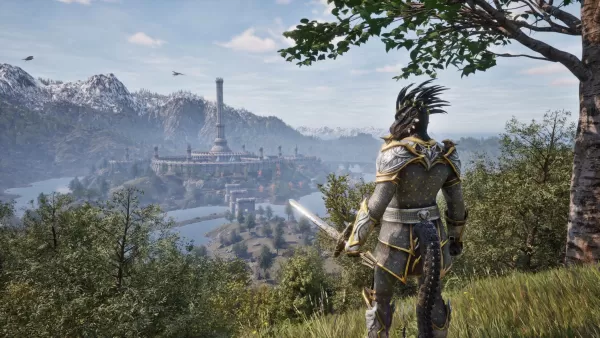"Remakes Key to Bethesda's Revival, Oblivion Shows"
By Azura, by Azura, by Azura – the rumors were true. Yesterday, Bethesda set the internet ablaze by unveiling Virtuos’ remaster (or is it really a remake?) of The Elder Scrolls IV: Oblivion during a surprise shadow-drop at an ‘Elder Scrolls Direct’ event. This announcement led to hundreds of thousands of concurrent players, marking a moment of global hype and celebration that feels like a much-needed respite from the challenges Bethesda Game Studios has faced in recent years. From the prolonged efforts to repair Fallout 76’s rocky launch to the lukewarm reception of its new sci-fi universe, Starfield, many fans have wondered if Bethesda has lost its touch. With fierce competition in the RPG market from titles like Larian Studios’ Baldur’s Gate 3 and Obsidian’s The Outer Worlds, both of which have been hailed as spiritual successors to Elder Scrolls and Fallout, Bethesda's recent projects have left fans questioning the studio's direction. Yet, this re-release of Oblivion might be the step forward fans have been hoping for, albeit in an unexpected way.
At its peak, Bethesda Game Studios was unrivaled in the RPG genre. According to Microsoft’s leaked FTC documents in 2020, Fallout 4 had sold 25 million units, with over 5 million units sold in its first week alone, as reported by VGChartz. In 2023, Todd Howard announced that Skyrim had surpassed 60 million sales, though this number reflects multiple re-releases. In contrast, Starfield's sales are estimated at just over three million units a year-and-a-half post-launch. Considering the impact of Game Pass subscribers and the absence of a PlayStation version, this figure might be disappointing for Bethesda. Even within the Starfield community, there's dissatisfaction with the game's first expansion, Shattered Space.
This situation presents a significant challenge for Bethesda. With The Elder Scrolls 6 and Fallout 5 years away, how can this iconic RPG developer reignite its fanbase? The solution may lie in revisiting its past.
Rumors of the Elder Scrolls IV: Oblivion remaster surfaced in September 2023 when leaked Microsoft documents revealed several unannounced Bethesda titles, including this remaster of the 2006 classic. Speculation continued until January 2025, when a former Virtuos employee leaked more details, sparking debates among Elder Scrolls fans about the remaster's authenticity. The excitement reached a crescendo last week when Bethesda officially revealed the remaster, prompting over 6.4 million Google searches for ‘The Elder Scrolls IV: Oblivion’ – a 713% increase in the last week alone. Bethesda's reveal livestream peaked at over half a million viewers, and despite the leaks, more than 600,000 tuned in to see the re-reveal of a 19-year-old game. The overwhelming demand led to crashes on discount game key websites like CDKeys and slowed down Fanatical and Green Man Gaming. As of yesterday, Steam reported 125,000 concurrent players, with the game becoming the #1 best seller. The enthusiasm for Oblivion mirrors the fiery intensity of the Oblivion gates themselves.
The message from players is clear: if you (re)build it, they will come. Bethesda can keep fans engaged during the long wait for new titles by inviting them back to beloved worlds like Morrowind or the post-apocalyptic landscapes of Fallout. From a commercial perspective, this strategy is sound. While Bethesda's main team focuses on new projects, partners like Virtuos can leverage existing blueprints to create remasters more quickly. These remasters tap into established fanbases and offer new generations the chance to explore the rich lore of Tamriel or the post-apocalyptic adventures in Las Vegas and D.C.
Bethesda has previously leveraged its catalog effectively. During the first season of the Fallout TV show on Prime Video, Fallout 4 was discounted by up to 75%, accompanied by a next-gen update that included homages to the show. This move resulted in a 7,500% sales increase in Europe, despite the game being nearly a decade old.
 Oblivion Remastered offers a visit to the past that looks like the future. Image credit: Bethesda / Virtuos
Oblivion Remastered offers a visit to the past that looks like the future. Image credit: Bethesda / Virtuos
Looking back at Microsoft’s leaked Bethesda roadmap, it was noted that a Fallout 3 remaster was slated to follow Oblivion two years later. Although the timelines have shifted – Oblivion was originally planned for fiscal year 2022 – a Fallout 3 remake might be on the horizon for 2026, aligning with the release of Fallout Season 2. Given the connection between the first season of the Fallout TV show and Fallout 4, it's conceivable that Bethesda could be planning a surprise New Vegas remake to coincide with the show's second season, which focuses on New Vegas. The shadow-drop of Oblivion suggests that Bethesda is capable of such strategic surprises.
The message from players is clear: if you (re)build it, they will come. However, if there’s one game in Bethesda’s back catalog that deserves a remake the most, it’s The Elder Scrolls III: Morrowind. Fans have long campaigned for this, with some even remaking Morrowind using Skyrim’s tools, as seen in projects like Skyblivion. Yet, Morrowind poses unique challenges. It stands at the crossroads of Bethesda’s evolution, with its partially voiced narrative, text-based storytelling, lack of quest markers, and absent combat physics. While Virtuos successfully modernized some of Oblivion’s systems, Morrowind’s entire gameplay is built around these unique mechanics. Remaking Morrowind requires a delicate balance: modernize too much and risk losing its original charm, or retain too many old systems and risk alienating new players.
When a studio becomes synonymous with a gaming sub-genre, the challenge lies in innovating while retaining its audience. Rockstar Games has kept Grand Theft Auto fans engaged through the expansive world of GTA Online, which supports the development of the highly anticipated GTA 6. Bethesda’s strength lies in its richly detailed, single-player worlds – a formula that Elder Scrolls Online and Fallout 76 have struggled to replicate. The enthusiastic response to Virtuos’ Oblivion remaster demonstrates that gamers are eager to revisit Bethesda's classic titles. While not every remaster is guaranteed success – as seen with Rockstar’s GTA Definitive Editions – this particular remaster showcases careful consideration and skilled development. For Bethesda, a former leader in the modern RPG genre, breathing new life into its old classics could be the path back to glory.






















![FurrHouse [Ch. 3]](https://images.dshu.net/uploads/30/1719555089667e54115d59f.jpg)





